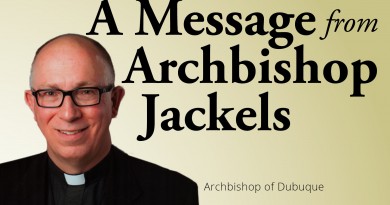Stewardship tells who we are and what we are to do
A reflection in light of the Paris climate agreement decision
By Archbishop Michael Jackels
Witness Publisher
The President recently withdrew the USA from the Paris climate agreement, to the joy of some, but to the disappointment of many.
I can’t comment on the value of the agreement as a political document, or the reasons for withdrawing from it, or the significance of that retreat.
Regardless of the politics, I respond as a teacher of the gospel, hoping that it should not be taken by anyone as repudiating the concern about creation.
And given some of the reasons given for withdrawal, hoping too this should not be taken as license to use and abuse creation as one sees fit.
Why? Because of stewardship, which for Catholics has the weight of biblical teaching, and for all has the attraction of something true, good, and beautiful.
One of our mission priorities in the Archdiocese of Dubuque is to teach stewardship as a way of life. As such, stewardship tells who we are and what we are to do.
First of all, who we are: caretakers, managers of all that we are, can do, and have, such as our time and treasure.
As managers, we do not own anything. All is on loan from God; whatever it is, it is not mine to use or abuse as I please.
This leads to learning what we as stewards are to do: we possess and use whatever according to God’s good pleasure, which means that we provide for ourselves and our dependents what is needed to live in human dignity.
But we also share some of it to help those who cannot provide for or protect themselves, as well as to support the Church’s mission.
Our responsibility to provide for and protect others is greatest when others are least able to do for themselves, say, a child in the womb or an aged person.
Our responsibility to provide and protect may decrease as the other’s ability increases, but it never goes away entirely.
We would make the same mistake as Adam and Eve if we were to repudiate concern about creation, or to take license to use and abuse creation as one sees fit.
We are not God. Humans are as much creatures of God as mineral, plant, and animal creation. All belongs to God; only God can claim absolute ownership.
It would be a sin to take the place of God, to be self-centered, selfish in relation to creation, and thereby distort the dominion over creation God gave to humans.
Dominion does not mean domination, but use for need, careful not to stretch need to include want, or to waste, or to forget that I am not the only one who has needs.
Regardless of politics, we are stewards, to care about and care for home and family, neighborhood and community, state and nation, parish and archdiocese, and for the earth, our common home.


